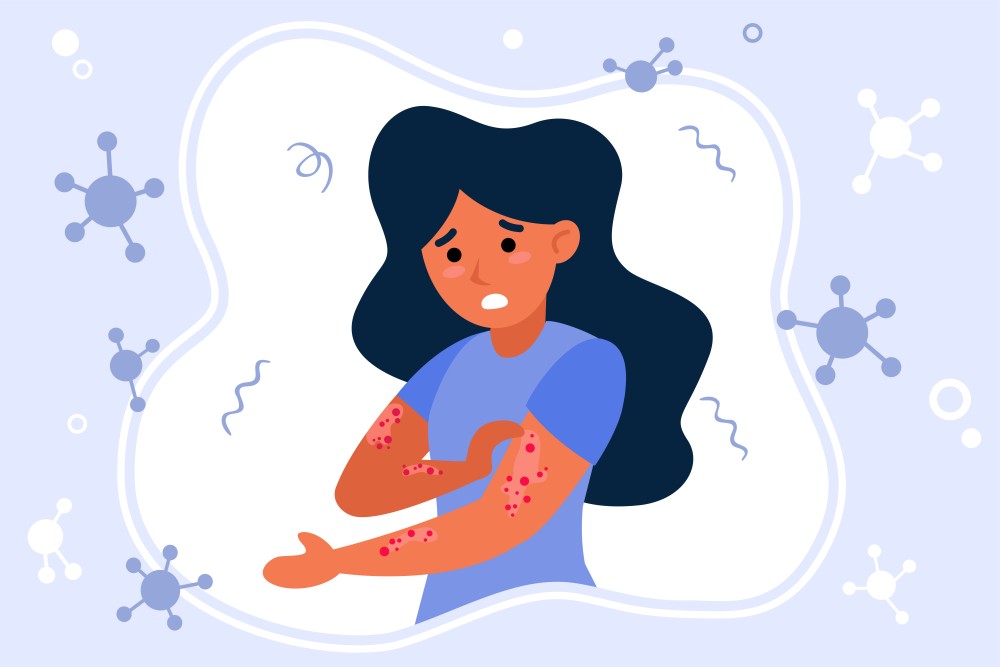Learn about tick bites and how they can lead to a red meat allergy, known as alpha-gal syndrome, caused by the lone star tick. Understand the symptoms and preventative measures to manage this allergic condition effectively. Learn about our tick control services in Canada.
What Causes Tick Bite Meat Allergy?
How Does a Tick Bite Lead to Red Meat Allergies?
When a tick bites you, it can cause some surprising problems. Certain ticks, like the lone star tick, have stuff in their saliva that can make you allergic to red meat. Here’s how it happens: the tick puts a sugar called alpha-gal (galactose-alpha-1,3-galactose) into your blood. Your body thinks this sugar is a bad thing and makes IgE antibodies to fight it off. Later, if you eat red meat, these antibodies can cause an allergic reaction.
Understanding Alpha-Gal Syndrome and Its Connection to Ticks
Alpha-gal syndrome is a food allergy linked to tick bites, especially the lone star tick. This problem makes your body react to meats like beef, pork, or lamb. When the tick puts alpha-gal into your body, your immune system creates allergen-specific IgE antibodies. Later, when you eat red meat, your body might have a delayed allergic reaction. This reaction can include itching, hives, or stomach aches. It’s different from most food allergies because it doesn’t happen right away.
Which Ticks Are Responsible for Causing Meat Allergies?
The main tick causing meat allergies is the lone star tick, known as Amblyomma americanum. These ticks mostly live in the southeastern U.S., but they are spreading north. They cause tick bites and can spread diseases, including alpha-gal sensitivity. If you spend time where these ticks are, you might get tick bite allergies leading to alpha-gal syndrome. Check for ticks after being outdoors to avoid these allergies.
Learn more: Tick Bites That Won’t Heal: Understanding the Symptoms and Prevention and What Are Ticks Good For in the Ecosystem?
Identifying Symptoms of Red Meat Allergy
What Are Common Signs of Red Meat Allergies from Tick Bites?
Red meat allergies can be surprising, especially when linked to tick bites. This condition is called alpha-gal syndrome (AGS). It happens when the immune system reacts to a sugar molecule called alpha-gal found in most mammals. After a tick bite, people might develop IgE antibodies that trigger allergic reactions.
Common symptoms of a mammalian meat allergy include:
- Hives or itchy skin
- Swelling of the lips or face
- Stomach pain or diarrhea
- Trouble breathing or wheezing
- An anaphylactic reaction, which is very serious and needs quick medical help
These reactions might not happen right away and can occur several hours after eating red meat. It’s important to know these signs if you live in areas with lots of ticks.
How to Differentiate Between Regular Food Allergies and AGS?
Food allergies and alpha-gal syndrome can look alike, but they are different. Both involve the immune system reacting to foods. However, AGS starts with a tick bite and is triggered by alpha-gal found in red meat.
Here’s how to tell them apart:
- Timing: Regular food allergies usually cause fast reactions after eating. But AGS reactions can be delayed for hours.
- Symptoms: Both can cause hives, stomach problems, and breathing issues. AGS might have more severe symptoms due to the delay.
- Diagnosis: Doctors may use an allergen-specific IgE test to check for AGS. This test looks for IgE antibodies related to alpha-gal.
Always talk to healthcare providers for a correct diagnosis if you think you have a mammalian allergy or other food allergies.
Are Delayed Reactions Common in Alpha-Gal Syndrome?
Yes, delayed allergic reactions are common in alpha-gal syndrome. Unlike regular food allergies, which cause immediate reactions, AGS symptoms can appear 3 to 6 hours after eating red meat. This delay makes it hard to figure out what’s causing the reaction.
The body’s hypersensitivity to alpha-gal, due to IgE antibodies, causes these effects. When someone with AGS eats red meat, their immune system mistakes alpha-gal as dangerous, triggering an immune response.
Knowing about these delayed reactions helps manage AGS and avoid red meat to prevent future allergic episodes. If you think you have AGS, see a healthcare professional for proper testing and advice.
Effective Management of Tick-Induced Allergies
What Treatments Are Available for Managing Alpha-Gal Syndrome?
Managing alpha-gal syndrome involves a team effort with allergists and healthcare providers. When someone is diagnosed, they work with doctors to find out what symptoms they have and what triggers them. Treatments often include medicines to help with things like skin rashes or upset stomachs. Each person’s allergy treatment plan is unique, based on how strong their allergic reactions are and their health. Experts in immunology help you avoid triggers and handle surprise exposures. Regular check-ups with doctors help keep the condition under control.
How Can Diet Changes Help in Coping with Red Meat Allergy?
Changing your diet can help a lot when dealing with red meat allergies like alpha-gal syndrome. Doctors usually suggest staying away from allergens such as red meat and foods made from mammals. By cutting out red meat, you may have fewer allergic reactions. It’s important to eat well, so seeing a dietitian can help make sure you’re getting good nutrition. Learning to read food labels and finding different protein options are important steps in making these changes successfully.
Is it Possible to Desensitize Against Red Meat Allergy?
Desensitization for red meat allergies caused by alpha-gal syndrome is being researched. This means slowly changing the immune response to lower allergic reactions. Allergen immunotherapy, done by an allergist, is a possible treatment scientists are studying. It isn’t widely available yet, but there are new medical advancements that might help. The aim is to make symptoms milder and life better. Keep up with new treatments by talking with doctors who know about allergies and immunology.
Preventing Tick Bites and Meat Allergies
What Are the Best Strategies to Avoid Tick Bites?
Tick bites can cause health problems, so it’s important to know how to prevent them. Here are some easy ways to avoid tick bites:
- Avoiding Tick Habitats: Ticks like grassy, bushy, or wooded areas. When you’re outside, stick to clear paths, and try not to touch tall grass or bushes.
- Using Tick Repellents: Use insect repellent with DEET or permethrin on your clothes and skin. These help keep ticks away.
- Wearing Protective Clothing: Wear long-sleeved shirts and pants to keep ticks off your skin. Tuck your pants into socks or boots for extra protection. Light-colored clothes make it easier to see ticks.
- Performing Regular Tick Checks: After being outside, check your body for ticks. They like to hide under arms, behind ears, and around the waist.
- Removing Ticks Safely: If you find a tick, use tweezers to grab it close to your skin. Pull it out straight without twisting, then clean the area with antiseptic.
These steps can help prevent tick bites and keep you healthy.
How Does Tick Bite Prevention Help in Reducing Allergy Risks?
Stopping tick bites helps protect against diseases and allergies from ticks. One big concern is tick-borne allergies, like alpha-gal syndrome, caused by a sugar called alpha-gal from a tick bite. This can make people allergic to red meat.
When bitten by a tick, your body might produce allergen-specific IgE antibodies that react to alpha-gal. This can make you allergic to red meat such as beef or pork. By preventing tick bites, you lower the risk of these allergies.
Are There Special Precautions for People in High-Risk Areas?
People in areas where ticks are common should take extra care.
- Public Health Awareness: Learn about local tick seasons and public health warnings. Community resources offer information about tick allergies and prevention.
- Lifestyle Changes for Alpha-Gal Awareness: In tick-heavy places, think about changing outdoor activities during peak tick seasons or altering your yard to keep ticks away.
- Increased Vigilance: Check pets and family for ticks after being in areas with many ticks. Bath or shower within two hours of being outdoors to reduce tick attachment.
- Educating Others: Share what you know about preventing ticks and alpha-gal syndrome with neighbors and friends to create a safer community.
These actions help people in high-risk areas minimize the risk of ticks and related allergies. Staying informed and proactive keeps everyone safer from ticks.
Seeking Medical Support for Tick Bite Allergies
When Should You See a Doctor for Tick-Induced Allergies?
If a tick bites you and you notice signs like rashes, dizziness, or trouble breathing, go see a healthcare professional. Even mild reactions after eating meat should prompt a visit to an allergist. Severe allergic reactions need immediate attention. Doctors can diagnose your condition and help manage symptoms. Always seek medical advice to stay safe.
How Do Healthcare Providers Diagnose Meat Allergies from Ticks?
Healthcare providers use specific tests to find out if tick bites cause allergies. If you think you have a food allergy, especially to meat, talk to your doctor. They might do a blood test to look for IgE antibodies, which show an allergic reaction. This is called alpha-gal diagnosis and helps find the cause of your symptoms. Getting a correct diagnosis is key to managing any food allergy.
Can Medications Alleviate Symptoms of Alpha-Gal Syndrome?
If you have alpha-gal syndrome, some medications can help reduce symptoms. Doctors might give you epinephrine for severe reactions. Managing a red meat allergy involves knowing how your immune response works, especially allergen-specific IgE. While some medicines help with symptoms, always follow your doctor’s advice for safety. Consult your healthcare provider for the best treatment plan.
Frequently Asked Questions: FAQs About Tick Bites Red Meat Allergy
What is alpha-gal syndrome and how is it related to red meat allergies?
Alpha-gal syndrome, also called a red meat allergy, is when you get an allergic reaction from eating certain meats like beef, pork, and lamb. This happens because of a sugar molecule called alpha-gal found in these meats. Tick bites, especially from the Lone Star tick, can cause this allergy. Symptoms may include itching, belly pain, or even trouble breathing.
Can tick bites really cause red meat allergies?
Yes, tick bites can make you allergic to red meat. When a tick bites, it might introduce the alpha-gal sugar into your body, leading to an allergy. It’s important to stay away from ticks and talk to a doctor if you think you have this allergy.
Are there any reliable sources for understanding alpha-gal and tick-related allergies?
Yes, places like the Mayo Clinic and scientific articles on topics like clinical virology have good information about alpha-gal and tick allergies. These sources can help you learn about symptoms, how to find out if you have it, and how to manage it.
How does alpha-gal affect my lifestyle and diet?
Having alpha-gal means you should not eat red meats or foods with ingredients from mammals. You need to check food labels and be careful about what you eat to manage the allergy.
Are there other conditions associated with tick bites that I should be aware of?
Yes, besides alpha-gal, tick bites can give you other diseases like Lyme disease and babesiosis. It’s important to protect yourself from ticks and see a doctor if you feel unwell after being bitten.
How can I manage and prevent symptoms associated with tick-related allergies?
To manage tick allergies, avoid areas where ticks live, use bug spray, and wear protective clothes. A doctor can give you advice on treatment, like using antihistamines, to help with symptoms.
Is there ongoing research or developments concerning alpha-gal and related allergies?
Yes, researchers at places like Yale and UT Southwestern Medical Center are studying alpha-gal and tick allergies. Keeping up with new research can help you find better ways to handle and prevent these allergies.
Tick Bites Red Meat Allergy – Key Insights
- Alpha-gal syndrome, or red meat allergy, happens after a tick bite. It makes you allergic to alpha-gal, a sugar in meats like beef, pork, and lamb.
- Tick bites can cause slow allergic reactions, making you unable to eat meat with alpha-gal.
- Cetuximab, a cancer drug, may trigger alpha-gal allergy because it shares stuff with animal meats. Ask your doctor about this.
- NSAIDs (nonsteroidal anti-inflammatory drugs) and alcohol may make alpha-gal symptoms worse. Be careful with these.
- Places like the USA, Africa, Sweden, and Germany have seen cases of this tick-related allergy.
- Children and older people may have stronger symptoms. It’s important for doctors to know this for caring for kids and older folks.
- Learning about how our body reacts to tick bites can help prevent and manage allergies to red meat.
- Try not eating red meat and read food labels well to feel better if you have alpha-gal sensitivity.
- Blood tests and seeing experts in immunology and allergy can help diagnose and treat this condition.
- Working with groups like the American Society for Microbiology and Australasian Society of Clinical Immunology and Allergy gives good info on new research.





